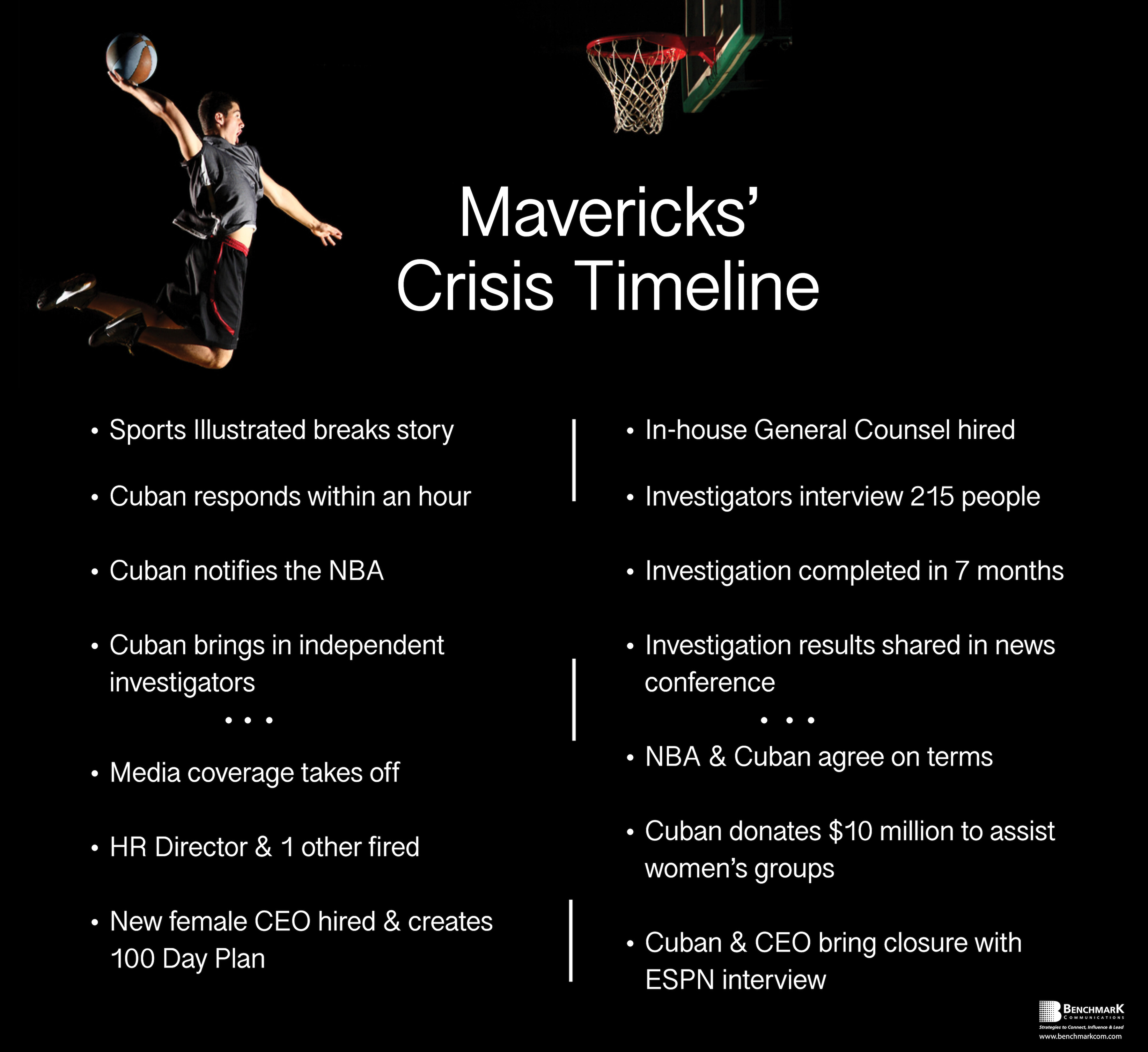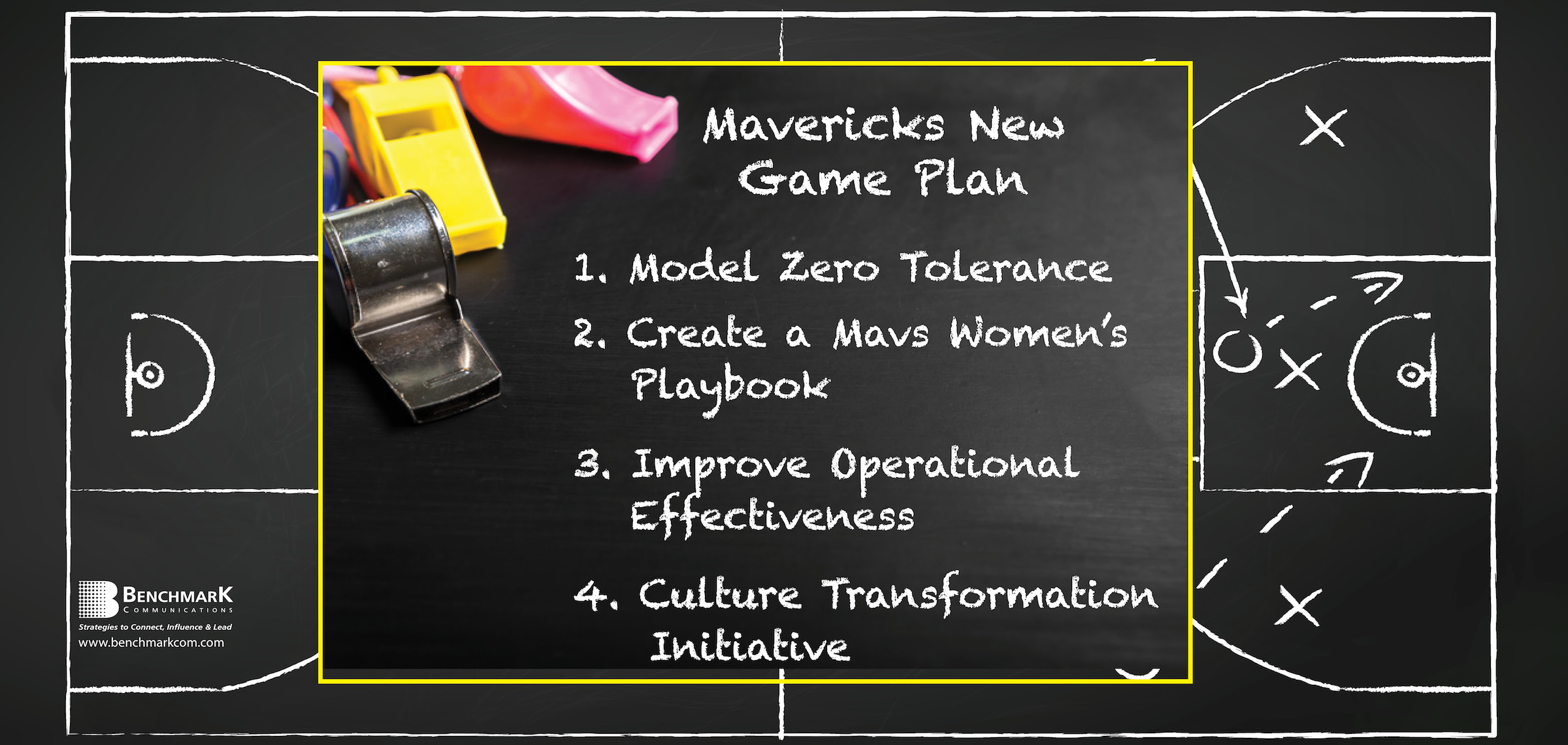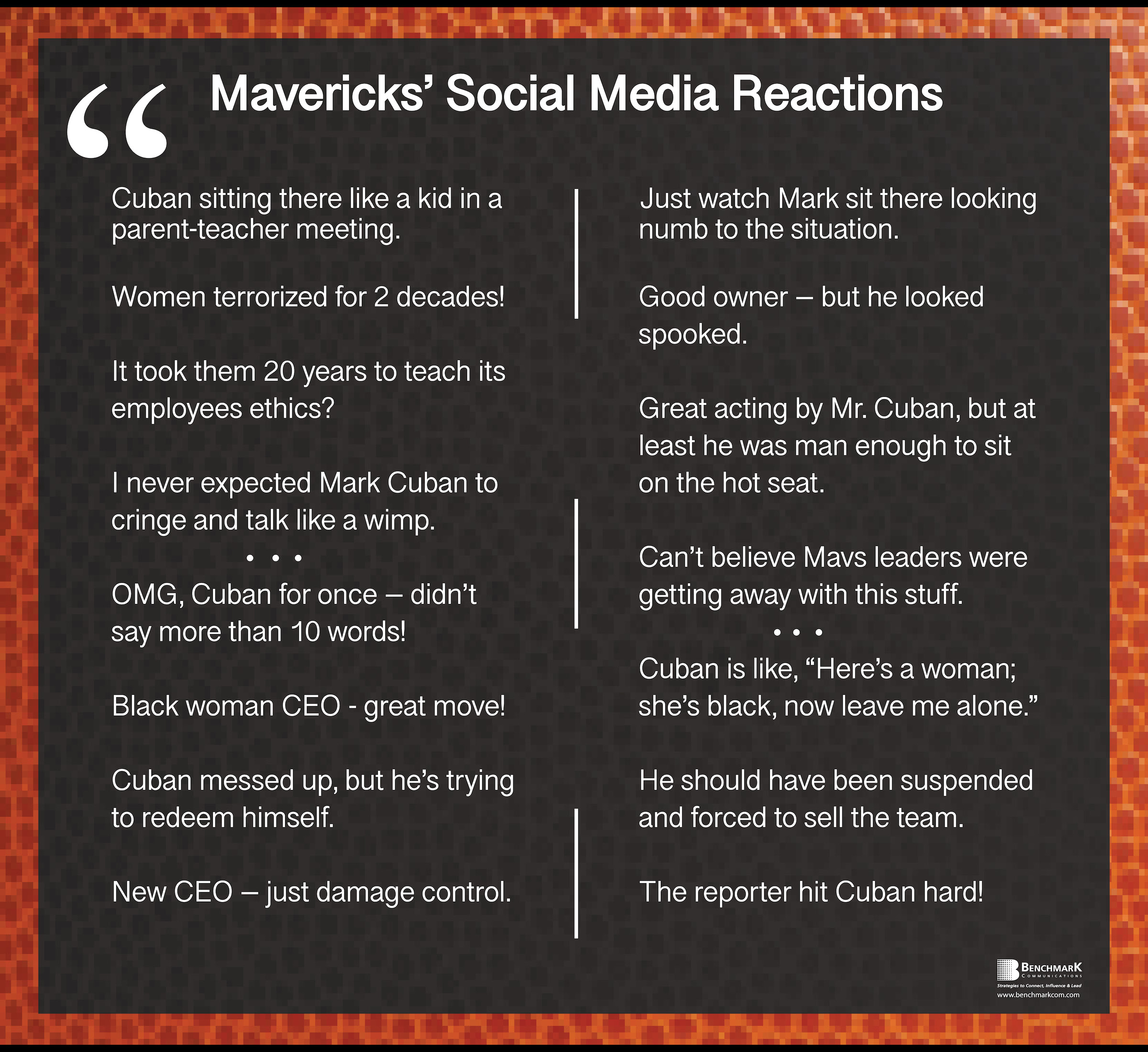2018 will be remembered as the year when the #MeToo movement hit the accelerator and began outing toxic corporate cultures lurking in the heart of many high-powered organizations. The movement is shaking up Corporate America, and waking up leaders to the new #MeToo crisis reality. CEOs, HR, Legal, PR and other leaders can use the “crisis lessons learned” from this year’s #MeToo outing that landed in the lap of Mark Cuban and the Dallas Mavericks. Lessons from the Mavericks’ #MeToo crisis can help you in many ways. You can improve your organization’s reputation management and HR game plans – before you are hit with the glare of media headlines, lawsuits, investigations and a tarnished reputation. You can also dig deeper with better risk assessments to discover if you and your organization could be blindsided with #MeToo issues buried in your organization.
The Blindside of Reputation Management
If only you had a crystal ball that could tell you when your organization is just days away from a major crisis. You could act to save your company and stakeholders a lot of pain. Unfortunately, a crisis doesn’t make an appointment. The Dallas Mavericks got their #MeToo wake-up call earlier this year when Sports Illustrated contacted team owner Mark Cuban. The magazine had conducted an investigation and was ready to roll with a bombshell report detailing twenty years of sexual harassment and predatory behavior in the Mavericks’ organization. Cuban says he was blindsided by the accusations. The report painted a picture of the Mavericks’ female employees working daily in an environment of fear. The report said many simply left. The ones who stayed warned new hires to never be caught alone with former president and CEO Terdema Ussery. When the story first broke, Cuban told Sports Illustrated, “I can’t tell you how many times particularly since all [#MeToo] stuff has been coming out I asked our HR director, ‘Do we have a problem? Do we have any issues I have to be aware of? And the answer was no, no, no, no every time.’” For years Cuban has touted being a hands-on sports leader, so some people openly questioned how he couldn’t know that his CEO and others were making life miserable for women in the Mavericks’ workplace. Cuban later said, “In hindsight, it was staring me right in the face and I missed it.”
How can you benefit from Cuban’s mistakes?
Cuban quickly understood the severity of the allegations, and although he did not get everything right, the usually outspoken “Shark Tank” TV star did enough right to provide a solid crisis template for other leaders and organizations. NBA Commissioner Adam Silver agrees that other league owners can learn from the Mavericks’ crisis response by adopting some of the team’s new mandates to improve cultures and working conditions. You can also use Cuban’s learnings to conduct some #MeToo soul-searching and crisis management planning. If there is anything redeeming about a crisis it is that the “lessons learned” can provide a clear reputation road map for your organization and others. This requires your leaders to act and accurately capture the “lessons learned” in the wake of a crisis. Often, it pays to call on outside consultants to gather your “lessons learned,” because they are not blinded by self-perspective. Here are some key things to help you glean major lessons learned from the Dallas Mavericks’ #MeToo crisis response.
How did the Mavericks’ story break?
Sports Illustrated (SI) investigative reporter Jessica Luther broke the story. She is the same reporter who broke the Baylor University rape story in 2015 that brought down head coach, Art Briles and others. SI started receiving news tips about the Mavs’ toxic culture after they published a story about sexual harassment in the Carolina Panthers’ organization. The news media (and social media) are the public’s bullhorns today. If your organization has issues, people will call the media or express their concerns on Twitter and other social media sites.

How quickly did the Mavericks’ respond?
Sports Illustrated (SI) reporter Jessica Luther told the Fort Worth Star Telegram she was pleased when Mavericks’ owner, Mark Cuban, personally called SI within an hour of the magazine’s inquiry. Cuban has stated in books and interviews that he believes an owner is much more credible to the media and public than PR firms, so it isn’t surprising he took the lead and personally responded. A timely response is the absolute key to a successful crisis response! I have witnessed great organizations fail to respond quickly to crises, and it costs them on many fronts. Primarily it costs them public trust and that snowballs into a mountain of other issues and problems. Once you lose trust, everything is harder.
What was the first impression of the Mavericks’ response?
Everything you do communicates and the first impression in a crisis response is crucial. It sets the entire tone for how the news media and public perceive your organization. This is why having the right leader with strong spokesperson skills is paramount. A first impression isn’t just about the words – it is about the response time, the nonverbal delivery, attitude, focus, transparency and overall tone. When Cuban responded to Sports Illustrated’s media inquiry within an hour and seemed genuinely upset, that communicated transparency and empathy. The SI reporter also perceived Cuban was not working with a PR or crisis management team, “He didn’t have a set line (message) that he repeated over and over,” recalls Luther. As a leadership and reputation management consultant who helps Fortune 500 groups respond to crises, I believe crisis advisers are essential, but I fully understand this reporter’s reaction. Sadly, many PR firms still work under the old paradigm of loading a spokesperson down with cumbersome data and repetitive, self-focused scripts. This makes leaders and their organizations appear anything but human. A good executive coach and media trainer will help you appear less coached and less self-focused. Also, in fairness, some corporate communication teams have a hard time convincing their top leaders to invest in on-going spokesperson skills coaching. It is an investment that pays off!
What tangible actions did Cuban take to respond?
When you have a crisis, people expect and even demand tangible actions! Cuban immediately showed remorse and empathy for the women who said they had suffered under the former CEO and other male employees. Then, he started taking action. He contacted the NBA and launched an independent investigation with NBA oversight. Outside attorneys (and former prosecutors) who had no previous ties to the Mavericks were chosen to lead the investigation. This communicated that the process would be transparent with a foundation of integrity. Cuban fired the HR Director and another employee at the center of the scandal, and he immediately brought in Cynthia Marshall as the new CEO. She is a former AT&T executive known for her expertise in diversity. Cuban gave Marshall full authority to make whatever changes she deemed necessary to get the Mavericks on the right track. She interviewed all 141 Mavericks employees and then created a 100-Day Game Plan. The Plan served as a guide for the Mavericks’ crisis response and a roadmap to rebuild their troubled corporate culture.

What is the secret sauce to reputation management?
A crisis stirs things up – outrage, frustration and other emotions boil up to the top when negative news is revealed. When things boil up, communication is the secret sauce that people crave. They want to know how things affect them and what you are doing daily to address the issues. The Mavericks investigation took a little more than seven months to complete. During this time, the Mavericks’ new CEO set out to communicate with employees, the NBA and the public that things were moving and changing. Communication helps build trust and improve the organization’s reputation. CEO Marshall communicated that cultural changes were in full-speed mode and backed it up with many tangible actions. She increased the number of women in leadership positions from zero to 46%. She brought in new female HR leaders to implement a massive overhaul of the Mavericks’ workplace culture and new training initiatives were put in place. A new General Counsel position was created to ensure HR policies are in line with laws and expectations.

How do you bring closure to a crisis?
How an organization brings closure to a crisis is a very important but often overlooked aspect of reputation management. I’ve seen some organizations do this well and others who completely miss the mark. Once the Mavericks’ internal investigation was finished, the details were shared during a news conference in Dallas headed by CEO Cynthia Marshall and Anne Milgram, an outside attorney from the investigative team. The two announced the findings, along with NBA mandates and a Mavericks’ game plan going forward. The final report was not pretty. It painted a picture of a toxic culture where sexual harassment and predatory behavior made it difficult for women to thrive. It blamed the Mavericks’ management for allowing the behaviors to exist, although it found Cuban was not aware of much of the daily realities. It confirmed a lack of solid procedures and HR policies to give “teeth” to a diverse and inclusive workplace. During the news conference, CEO Marshall confirmed many of the report’s recommendations were already in place or in the process of being put in place. She also announced a special website called Rebound where the media and public could go for more details. The site also includes the NBA’s response and outlines steps taken by the Mavericks organization to rebuild trust.
Can you answer the “why” of the #MeToo culture?
During the Mavericks news conference, a reporter asked why female employees had put up with this toxic behavior for twenty years. Lead investigator and attorney Anne Milgram said they were able to trace that back to the late 1990’s and the Bill Clinton / Monica Lewinsky scandal. Milgram revealed some of the Mavericks’ employees knew what happened to Lewinsky and decided they were not safe to tell the truth for fear that it could harm their careers.
Can your spokesperson be authentic AND empathetic?
Some reporters criticized Mark Cuban for not being present during the Dallas news conference when the Mavericks CEO and lead investigator shared the final investigation results. He was in Los Angeles taping shows for Shark Tank. But, CEO Cynthia Marshall, quickly joined him in L.A. for a lengthy ESPN interview to address the results of the investigation. I actually think this was a good call, because he gained the benefit of more time in a talk-show type format. At the same time, it was a strange sight to see Mark Cuban quiet and humble during that interview. In a way, it was almost too drastically different from his normal and robust persona. He could have still conveyed empathy for the females who suffered in the Mavericks’ workplace – without becoming an almost unrecognizable character in this chapter of his organization’s history. I would be curious to know if the persona he took on was his idea or came from someone else. The public and media judge by authenticity and Cuban could have been his authentic self and remorseful at the same time.
What are the benefits of immersing yourself in the victims’ perspective?
If you get just one thing right in a crisis response, it must be true empathy for victims. The first thing out Cuban’s mouth in the ESPN interview was, “First, just an apology to the women involved, the women that in a couple of cases were assaulted. And not just to them but their families, because this is not something that just is an incident and then it’s over. It stays with people and it stays with families. I’m just sorry I didn’t see.” The ESPN reporter held nothing back and asked how he could have not known about the harassment. He said, “I didn’t know, and I don’t have an explanation.” Cuban added, “I can give you lots of reasons, but they don’t matter. What matters is it was my responsibility and I have to be accountable for it.” Too many leaders fail to say, “The buck stops here,” – so good for Cuban.
What is Cuban’s best #MeToo risk and crisis advice for you?
Of all the comments we found from Mark Cuban about this painful crisis, there is one that stands out. Cuban’s best advice for other leaders came during his ESPN interview when he said, “You have to dig in – you have to sit there in the middle… and talk to people you typically wouldn’t have spoken to. You’ve also got to bring people in from the outside because your people may not be forthright with you – as the owners, as the leaders. We had to bring people in from the outside – and in the future we may bring outsiders in to proactively find problems,” Cubans adds. Too many organizations are reactive, instead of proactive in identifying risks that could turn into full-blown crises. As Ben Franklin said, “An ounce of prevention if worth a pound of cure.” It is promising that Cuban is taking a proactive leadership and risk management stance for the future.
What can you do differently in 2019?
The blunt impact of a crisis is painful, lengthy and costly. A crisis can suck the life-blood out of an organization and so much is lost: employee morale, reputations, public trust, money, resources, time, health, leadership focus and more. The Dallas Mavericks are just one of many groups hit this past year with the #MeToo crisis – Google, Uber, CBS News, Wynn Resorts, the Carolina Panthers, Fox News, Nike and others were also exposed as suffering from toxic cultures. With 2019 quickly approaching, this is a perfect time of the year to join with other leaders in your organization to identify some New Years resolutions regarding risk management. Take Cuban’s advice and bring in outside consultants for a complete #MeToo check-up. You could also discover other risks that are out of your awareness. A New Years check-up is good for your people, organization and future.
Contact Us For A Risk Assessment
Contact Us today to schedule a risk assessment for your organization. We can also help you with your training and coaching needs.
Crisis Management Consultants & Crisis Experts
Benchmark Communications’ crisis consultants have helped Fortune 500 groups and others address a range of issues: food contamination, class action lawsuits, activist protests, government investigations, internal issues, pipeline explosions, competitor meddling, mass killings, union issues, environmental disasters, E coli outbreaks, industrial accidents, oil spills, regulatory issues, chemical releases and much more.
Related Articles:
Media Ambush Interviews – 3 Survival Tips
What Crisis Leaders Have in Common With Movie Directors
Emotions & Crisis Response: How Emotions Can Sink Brands

